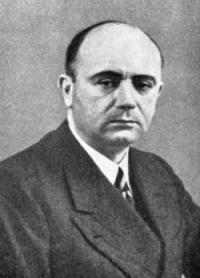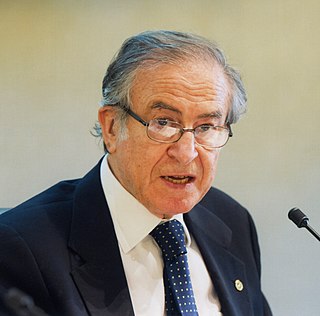Piero Boitani (born 1947) is an Italian literary critic. [1] [2] [3]
Piero Boitani (born 1947) is an Italian literary critic. [1] [2] [3]
Born in Rome, Boitani received his Ph.D. from Cambridge while teaching there and has taught in the University of Pescara and University of Perugia. He is Professor Emeritus of Comparative Literature at the Sapienza University of Rome and has taught at the Gregorian University and at the University of Italian Switzerland.
He was the President of the European Society for English Studies from 1989 to 1995 (now Founding President), as well as becoming a Fellow of the British Academy, the Accademia dei Lincei, the Academia Europaea, the Polish Academy of Arts, the Accademia delle Scienze di Torino, the Accademia dell’Arcadia, the Medieval Academy of America, and the Dante Society of America. In 2002 he received from the Accademia dei Lincei the Feltrinelli Prize for literary criticism, in 2010 the De Sanctis Prize, and in 2016 the Balzan Prize for Comparative Literature. [4] He is the literary editor of the Greek and Latin classics series, Fondazione Valla.
Boitani has published, among others, the following volumes:
He also edited and contributed to a number of other works, including:
He has edited and translated into Italian works including:

Enrico Cerulli was an Italian scholar of Somali and Ethiopian studies, a governor and a diplomat.

Sabino Cassese is an Italian jurist, former minister for the public function in the Ciampi government (1993–1994), and judge of the Constitutional Court of Italy (2005–2014).
Alberto Melloni is an Italian church historian and a Unesco Chairholder of the Chair on Religious Pluralism & Peace, primarily known for his work on the Councils and the Second Vatican Council. Since 2020, he is one of the European Commission's Chief Scientific Advisors.

Gian Biagio Conte is an Italian classicist and professor of Latin Literature at the Scuola Normale Superiore of Pisa.
Lorenzo Perilli is an Italian classicist and academic at the University of Rome Tor Vergata. A Professor of Classical Philology, he is Head of the Institute of Literature, Philosophy and Art history, and the Director of the interdisciplinary Research Centre in Classics, Mathematics and Philosophy Forms of Knowledge in the Ancient World, established in 2013 and devoted to ancient science and related disciplines. He is Co-director of the periodical Technai. An international journal on ancient science and technology, and serves on the board of the journal of ancient medicine Galenos.

Guglielmo Cavallo is an Italian palaeographer and Byzantinist, Emeritus Professor of the Sapienza University of Rome.
Michael Lapidge, FBA is a scholar in the field of Medieval Latin literature, particularly that composed in Anglo-Saxon England during the period 600–1100 AD; he is an emeritus Fellow of Clare College, Cambridge, a Fellow of the British Academy, and winner of the 2009 Sir Israel Gollancz Prize.
Luca Serianni was an Italian linguist and philologist.

Pietro Trifone, is an Italian linguist.

Gaetano Cozzi was an Italian historian, professor at Padua University, and researcher with the Giorgio Cini Foundation and Fondazione Benetton Studi e Ricerche. He was a specialist in Venetian history, with special attention to the institutions, the relationship between law and society and the cultural environment.

Giorgio Orelli was an Italian-speaking Swiss poet, writer and translator.
Nino Valeri was an Italian historian.

Alberto Quadrio Curzio is an Italian economist. He is Professor Emeritus of Political Economy at Università Cattolica del Sacro Cuore, Milan, President Emeritus of the Accademia Nazionale dei Lincei and President of the International Balzan Foundation "Prize".
Michael David Reeve FBA is a British classicist and professor emeritus at Cambridge University. One of the foremost textual scholars of his generation, he has published widely on the transmission of Latin and Greek texts. He served as the eighth Kennedy Professor of Latin.

Giorgio Ficara is an Italian essayist and literary critic. He is Full Professor of Italian Literature at the University of Turin.

Chiara Frugoni was an Italian historian and academic, specialising in the Middle Ages and church history. She was awarded the Viareggio Prize in 1994 for her essay, Francesco e l'invenzione delle stimmate.
Natalino Sapegno was a literary critic and Italian academician. He came to prominence as a leading scholar of fourteenth century Italian literature.
Gianfranco Folena was an Italian linguist, philologist, and academic.
Carmelo Samonà was an Italian academic and writer, as well one of the most important Italian Hispanists.
Paolo Prodi was an Italian historian and politician.